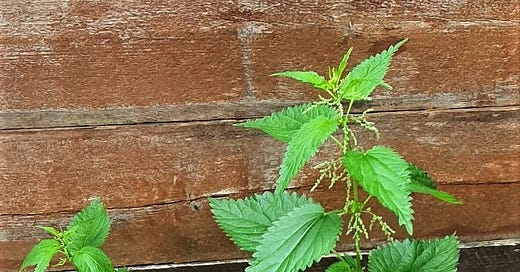Spring has arrived in the Northern Hemisphere. May is quickly approaching, which reminded me that now is the best time to collect young stinging nettle (Urtica dioica).
The stinging nettle is commonly associated with an unpleasant encounter with nature. While not so easy to harvest, stinging nettle is one of nature's most beneficial plants. Because it absorbs pollutants, it also cleans the air and soil. It should not be collected near roads or polluted areas. Stinging nettle is beneficial because it is a nutrient-dense herb, and it is also a food, like the dandelion.
Using gloves to collect the nettle eliminates the "auch" moment. Heat softens the little needles on the leaves and stems, but you can eat it even raw. It isn't a bizarre painful eating experience and is actually quite enjoyable, but more on that later.
What exactly makes stinging nettle so good?
The list is long: chlorophyll, carotenoids (lutein and zeaxanthin), polyphenols (kaempferol, quercetin, caffeic acid, coumarins and other flavonoids), antioxidants, dietary fiber, vitamin A (100 g provide 67% of the daily value), vitamin B2 (Riboflavin), vitamin C, Vitamin K (100 g provide 416% of the daily value), folic acid, iron, sulphur, calcium (100 g provide 37% of the daily value), magnesium, manganese (100 g provide 34 % of the daily value), selenium, zinc, potassium, boron, strontium and silica. Surprisingly, the green diva is high in easily digestible proteins. Actually, it is one of the plants with the highest protein content.
Nettle benefits come from both the root and the leaves.
It detoxifies both the environment and our bodies.
Because of its anti-inflammatory properties, stinging nettle is an excellent supplement for people suffering from arthritis, allergies, diabetes, cancer, heart disease, and various infections.
Reverses cell damage, which is a side effect of so-called COVID-19 vaccines.
Stinging nettle has the ability to prevent cardiovascular disease which is also adverse reaction from so called COVID-19 vaccines.
More on fixing the damage can be found here.Stinging needle is must for people with anaemia.
Reduces bleeding.
Stinging nettle can relieve unpleasant premenstrual symptoms including cramping and bloating, as well as reduce blood flow during menstruation.
Can ease the transition in women going through menopause by lowering the intensity of the hormonal shift in the body.
If you suffer from frequent urinary infections stinging nettle tea is for you because has antibacterial properties.
If you suffer from allergies add nettle to your diet.
Improves bone health and delays osteoporosis.
It is beneficial to gut health.
Improves vision and helps with age-related eye problems.
A cup of tea will make you look and feel younger since has anti-aging properties.
Stinging nettle can be used to treat diarrhea.
Taking oral supplements or teas can help with skin conditions such as eczema. Ointments containing nettle extract are also beneficial.
Rinsing the hair with stinging nettle tea promotes hair growth.
Stinging nettle is a fantastic fertilizer.
How to use it?
I'm going to start with stinging nettle salad. Put on your gloves and search for nettle. Pick up the new light-green leaves. After washing, simmer for 1 minute. Drain and toss with your preferred green salad dressing. If you want, add some vegetables or greens. Since the vinegar softens the hairs and they are less stinging in the young nettle leaves, I normally skip the simmering stage. Try it!
Nettle tea should be made with hot, but not boiling, water. Nettle tea, unlike the other tea extracts, requires a longer infusion time - approximately 20 minutes. It is entirely up to you how much you consume, but don't overdo it - 2 or 3 teaspoons nettle leaves per 200 ml is plenty.
Cooking nettle leaves is similar to cooking spinach. So, use your imagination.
It is much more difficult to harvest the root. It is typically used as a supplement, in teas, and as an addition to various meals after being dried.
*Check for potential drug interactions if you are taking any medications.
**If you've never tried stinging nettle, try it in the morning so you can seek help immediately if you become ill.
***If you buy stinging nettle fresh, as tea, or as a supplement, make sure it was harvested in an area free of pollutants. It absorbs the harmful substances, as I stated at beginning.
References
https://www.ncbi.nlm.nih.gov/pmc/articles/PMC4708629/#fsn3259-bib-0007
https://www.sciencedirect.com/science/article/pii/S2405844022010052
https://extension.oregonstate.edu/pub/em-9373
https://www.ncbi.nlm.nih.gov/pmc/articles/PMC3589769/
I do not profit from the herbs and supplements mentioned in my articles. If you find this information useful, please consider making a small donation through my blog or becoming a paid subscriber. It helps me to keep my work free for those who can't afford to support it.





